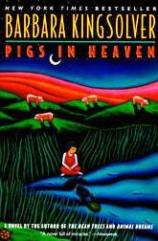Reading Group Guide
Discussion Questions
Pigs in Heaven

1. When Annawake first meets Taylor, she states the book's central problem this way: "There's the child's best interest and the tribe's best interest, and I'm trying to think of both things." What is Turtle's best interest -- in Taylor's view? in the tribe's view? in your view? Did the book change the way you might respond to such a case if you read about it in the newspaper? Do you think the events of the novel relate at all to the complexities of interethnic adoptions in general? Particularly in a racist society?
2. What motivates Taylor when she runs away? What motivates Annawake's pursuit of Taylor? How do you feel about these two women? In what ways are they similar? How do they change, and why?
3. Talking to Annawake, Jax poses the question: "How can you belong to a tribe, and be your own person, at the same time? You can't. If you're verifiably one, you're not the other." (chp. 15, "Communion"). Are there ways to reconcile the claims of individuality and those of the group? Does the novel suggest any of them? What does Alice discover, for instance, during the stomp dance (in Chp. 26, "Old Flame")? How do the values of the Cherokee community described here differ from those of dominant U.S. culture, particularly around this question of community vs. individualism?
4. The novel seems to suggest that cultural emphasis on independence, mobility, and self-reliance can lead to loneliness and alienation. How do individual characters -- Alice, Barbie, Rose, Cash, Taylor, Jax -- reflect this view of independence as isolation? Do you agree with the novel's judgement? How have you, or people you know about, been affected by the cultural celebration of "self-reliance?" Do you think men and women relate differently to this cultural value?
5. In explaining why it's important for the tribe to get Turtle back, Annawake tells Alice, "We've been through a holocaust as devastating as what happened to the Jews, and we need to keep what's left of our family together" (Chp. 27, "Family Stories"). How does the novel go about demonstrating the validity of this comparison? How do you feel about it? How should people living today deal with histories of oppression?
6. The title, Pigs in Heaven , refers to the Cherokee legend about the six bad boys that got turned into pigs before their mother's eyes. Annawake tells this story -- in two entirely different ways -- on page 87 and again on page 313. How does this story, in its two versions, demonstrate the book's theme, and Annawake's growth? In what other ways do pigs enter the story, as symbols of renegade individualism and community spirit?
7. How -- physically and spiritually -- does povery affect people's lives? How does poverty affect Taylor? Does this novel offer a judgement on poor people? On our society's attitudes towards poor people?
8. The novel is divided into three sections: Spring, Summer, and Fall, written in English and Cherokee. What significance for you is there in the fact that the novel is structured according to the cycles of nature, ending during harvest, just short of winter?
9. When Cash shoots his TV at the end, it's a rather complex image. If you think about the other scenes in which TVs and TV-watching figure, or how TV may be said to function in the U.S. culture at large, what possible meanings might his gesture have?
10. Occasionally, readers have felt that Kingsolver's heroines and endings are idealized -- that is, too good to be true. How do you feel about this criticism? First of all, would you agree that this is so in Pigs in Heaven ? Second, do you think that good fiction ought not to idealize its characters or situations?
Pigs in Heaven
- Publication Date: April 27, 1994
- Genres: Fiction
- Paperback: 352 pages
- Publisher: Harper Perennial
- ISBN-10: 0060922532
- ISBN-13: 9780060922535








